"Blaming your mistakes on your nature does not change the nature of your mistakes" Thomas Harris
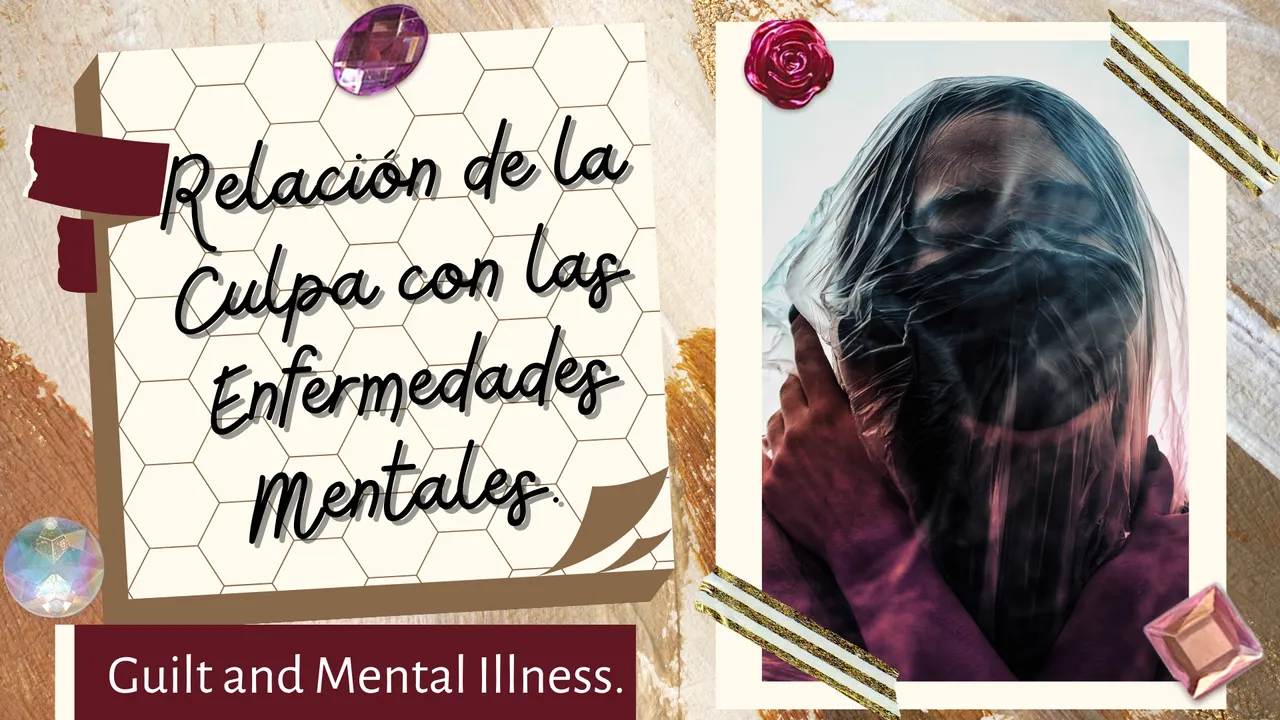

Saludos querida comunidad de catarsis, el día de hoy les traigo un tema del que es importante hablar pero que muchas personas no le dan la importancia que amerita y del que muy poco se habla por eso, y es la malvada Culpa.
Cuando aprendemos de Enfermedades Mentales hay sentimientos que son característicos de los pacientes que las sufren o del por qué empiezan a sufrirlas y uno de estos sentimientos es la culpa, lo usamos para detectar cuando algo no anda bien en la mente de alguien, es un elemento que incluimos en los criterios diagnósticos de Enfermedades Mentales.
Greetings dear community of catharsis, today I bring you a topic that is important to talk about but many people do not give it the importance it deserves and very little is said about it, and that is the evil Guilt.
When we learn about Mental Illnesses there are feelings that are characteristic of the patients that suffer them or why they start to suffer them and one of these feelings is guilt, we use it to detect when something is not right in someone's mind, it is an element that we include in the diagnostic criteria of Mental Illnesses.
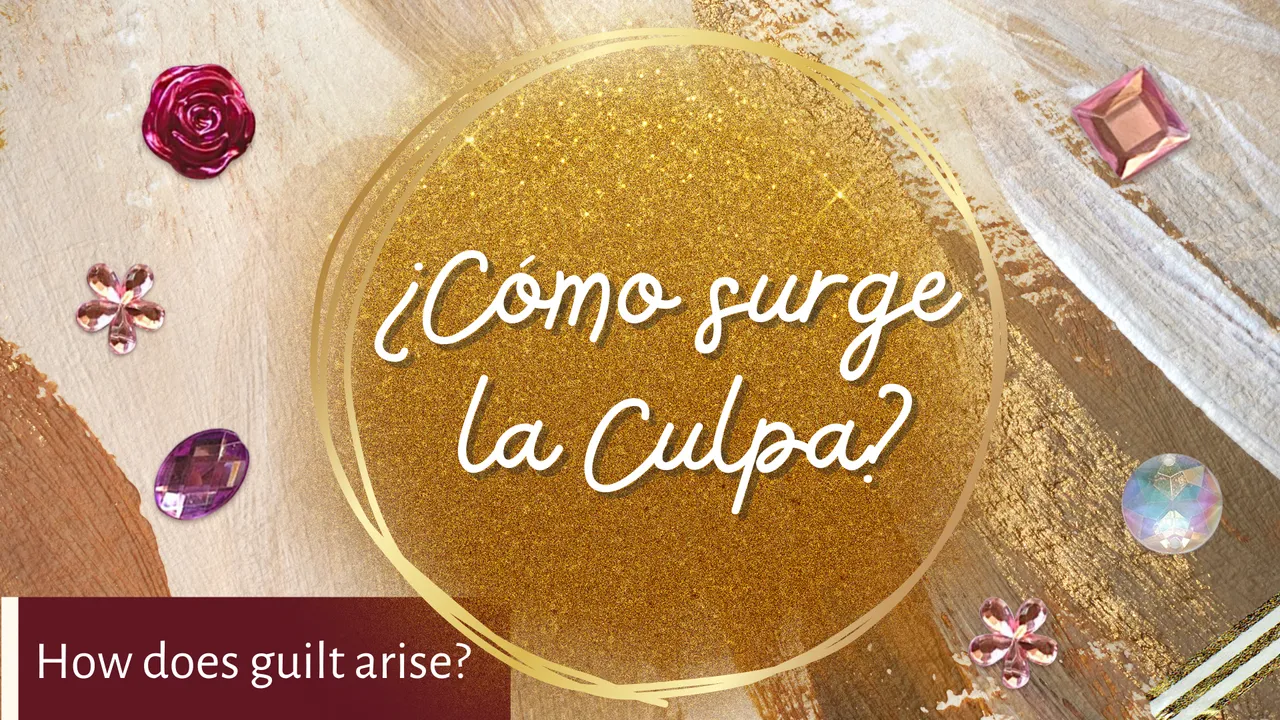

Desde que somos pequeños en nosotros empieza a formarse esta estructura mental en donde aprendemos inconscientemente a sentir culpa por algunos factores, nuestros padres nos enseñan que se debe hacer y que no, que es lo bueno y qué es lo malo, que causa sufrimiento en los demás y que no, pero muchas veces nuestros padres no saben lo duro que pueden llegar a ser con un niño cuando establecen esos parámetros en seres tan pequeños que apenas están en formación.
Siempre les digo a quien sea que por favor recuerden que la estructura emocional y la estabilidad mental de un adulto empieza en la infancia, que por favor hagan bien su trabajo como padres para que no tengamos que lidiar con tantos problemas en los adultos del mañana y creemos seres humanos funcionales y estables emocionalmente.
Pero la verdad es que incluso los padres no saben lo que es capaz de generar lo que inconscientemente hacen en sus hijos, y ellos no tienen tampoco la culpa de eso porque tienen desconocimiento sobre el tema, así que solo nos queda como profesionales tratar de reestructurar todo ese mal aprendizaje en los adultos que atendemos y tratar de ayudarlos a sobrellevar sus conocimientos adquiridos en la infancia.
Pero como yo quiero que ustedes aprendan sobre Enfermedades Mentales, se los voy a explicar; la estructura de la culpa empieza desde la infancia cuando le decimos a los niños no puedes hacer esto, no puedes hacer lo otro, eso que hiciste estuvo mal, quiero que hagas esto, quiero que hagas lo otro, poniéndole a los niños un peso en sus hombros que es difícil de cargar porque se auto establecen límites imaginarios que no pueden atravesar.
Since we are small in us begins to form this mental structure where we learn unconsciously to feel guilt for some factors, our parents teach us what to do and what not to do, what is good and what is bad, what causes suffering in others and what not, but often our parents do not know how hard they can be with a child when they establish these parameters in such small beings who are just in formation.
I always tell anyone to please remember that the emotional structure and mental stability of an adult begins in childhood, to please do your job well as parents so that we don't have to deal with so many problems in the adults of tomorrow and create functional and emotionally stable human beings.
But the truth is that even parents do not know what is capable of generating what they unconsciously do in their children, and they are not to blame for that either because they have no knowledge on the subject, so it only remains for us as professionals to try to restructure all that bad learning in the adults we serve and try to help them cope with their knowledge acquired in childhood.
But since I want you to learn about Mental Illness, I am going to explain it to you; the structure of guilt starts in childhood when we tell children you cannot do this, you cannot do that, what you did was wrong, I want you to do this, I want you to do that, putting a weight on their shoulders that is difficult to carry because they establish imaginary limits that they cannot cross.
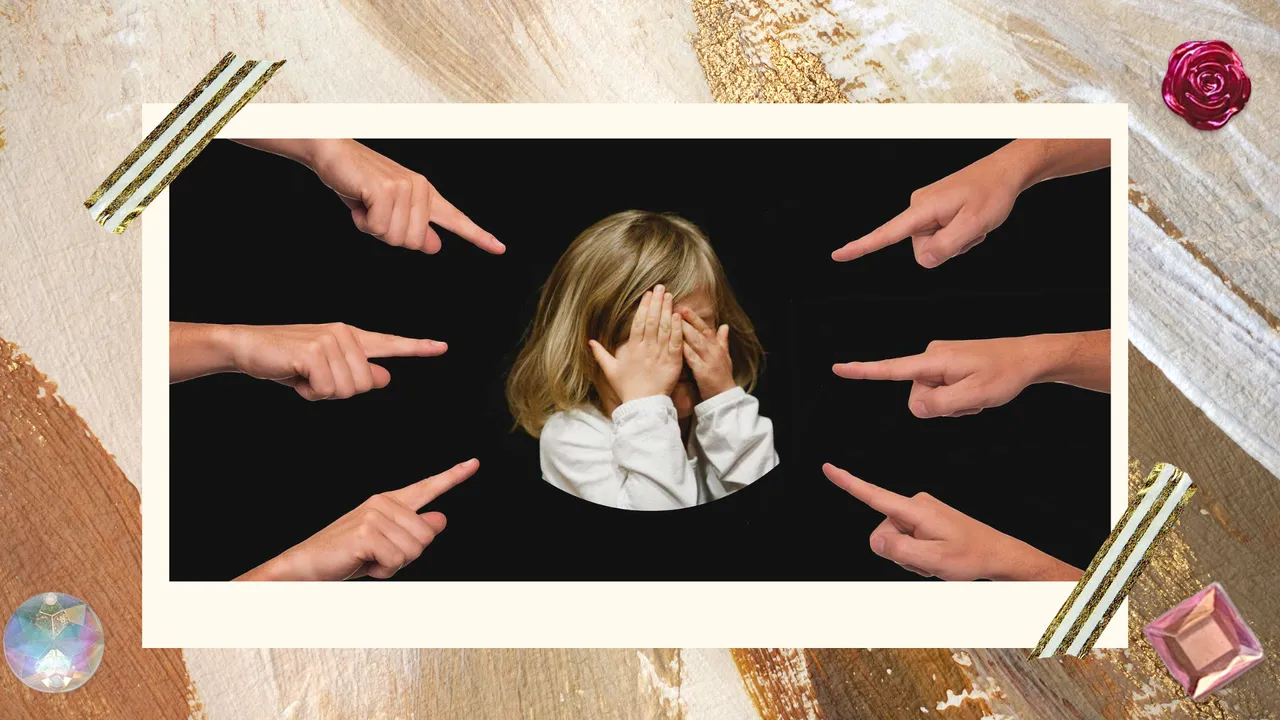

Los niños aprenden por sí solo, ellos ven y perciben lo que causan sus acciones, el felicitarlos por ciertas acciones y el ustedes ser felices por eso o ponerse mal por algo que ellos hacen, los hace a ellos entender qué acciones pueden o no pueden hacer, pero cuando tú les pones barreras a su forma de actuar, ellos empiezan a encerrar entre límites muy precisos la forma como deben actuar para no hacer sentir mal a los demás y para hacerlos felices, límites que terminan siendo tan rígidos que si los cruzan pueden llegar a hacerlos sentir realmente muy mal, tal vez cuando son niños no los notes tanto, pero vas creando un tipo de aprendizaje en su subconsciente del que es difícil escapar después.
Y más complicado es cuando los padres se molestan por muchas razones en su vida diaria y los niños perciben toda esa molestia sin saber qué hacer, un niño solo quiere que su padre sea feliz, son sus héroes, quieren ser como ellos, y cuando tienen este tipo de padres hostiles o malhumorados por muchas situaciones, entran en conflicto sin saber qué hacer, empiezan a desarrollar sentimientos confusos, no quieren molestar más a sus papas, quieren hacerlos felices, quieren enorgullecerlos, hacerlos sentir bien y pueden llegar a pensar que sus papas están así por su culpa.
Todo esto hace que inconscientemente los niños se sientan presionados en alcanzar unas metas específicas, esas metas que saben que a sus papás los harán felices, se vuelven niños perfeccionistas en sus actividades y parecen más maduros que la edad que realmente tienen, todo esto es porque se exigen demasiado así mismos, les han puesto una carga sobre sus hombros difícil de sobrellevar, algunos no desarrollan enfermedades a tan temprana edad, algunos si, y otros los desarrollan más adelante y solo algunos tendrán una estructura emocional tan fuerte que nunca lo harán.
Pero como este es un post dirigido a ustedes como adultos que ya tuvieron este tipo de crianza en la infancia y ni modo ya las estructuras mentales están creadas, lo que les dije arriba es para que sepan de donde deriva todo con la finalidad de que no reproduzcan esto más, pero si ya hubo ese aprendizaje en ustedes, no nos queda más que aprender a vivir con él y lidiar con lo que nos pueda causar.
En este post quiero que aprendan sobre la Culpa Patológica que podemos llegar a presentar en la edad adulta, así que cuando lleguen a este punto del post por favor vuelvan a leer la frase que les puse arriba: "Echarle la culpa a nuestra naturaleza de nuestros errores, no cambia la naturaleza de tus errores" Thomas Harris, porque cuando ya somos adultos ya debemos ser conscientes de nuestros errores y tratar de hacer lo posible por cambiar, de nada nos sirve echarles ya la culpa de nuestra naturaleza a nuestros padres, ahora nos toca mejorar por nosotros mismos y por los demás, pero por supuesto es necesario saber desde donde nace el sentimiento.
Children learn by themselves, they see and perceive what their actions cause, congratulating them for certain actions and being happy about it or being upset about something they do, makes them understand what actions they can and cannot do, but when you put barriers to their actions, they start to set very precise limits on how they can act, but when you put barriers to the way they act, they start to enclose within very precise limits the way they should act in order not to make others feel bad and to make them happy, limits that end up being so rigid that if they cross them they can make them feel really bad, maybe when they are children you don't notice them so much, but you create a kind of learning in their subconscious that is difficult to escape from later on.
And more complicated is when parents get upset for many reasons in their daily life and children perceive all that annoyance without knowing what to do, a child just wants their parents to be happy, they are their heroes, they want to be like them, and when they have this kind of hostile or grumpy parents for many situations, they get into conflict without knowing what to do, they start to develop confused feelings, they do not want to bother their parents anymore, they want to make them happy, they want to make them proud, make them feel good and they may even think that their parents are like this because of them.
All this makes children unconsciously feel pressured to reach specific goals, those goals that they know will make their parents happy, they become perfectionist children in their activities and seem more mature than the age they really are, all this is because they demand too much of themselves, they have put a burden on their shoulders difficult to bear, some do not develop diseases at such an early age, some do, and others develop them later and only some will have such a strong emotional structure that they will never do it.
But as this is a post addressed to you as adults who already had this kind of upbringing in childhood and no way the mental structures are already created, what I said above is for you to know where it all comes from in order to not reproduce this anymore, but if there was already that learning in you, we have no choice but to learn to live with it and deal with what it can cause us.
In this post I want you to learn about the Pathological Guilt that we can present in adulthood, so when you get to this point of the post please read again the phrase I put above: "Blaming our nature for our mistakes, does not change the nature of your mistakes " Thomas Harris because when we are adults we must be aware of our mistakes and try to do our best to change, it is useless to blame our nature to our parents, now we have to improve ourselves and others, but of course it is necessary to know from where the feeling is born.
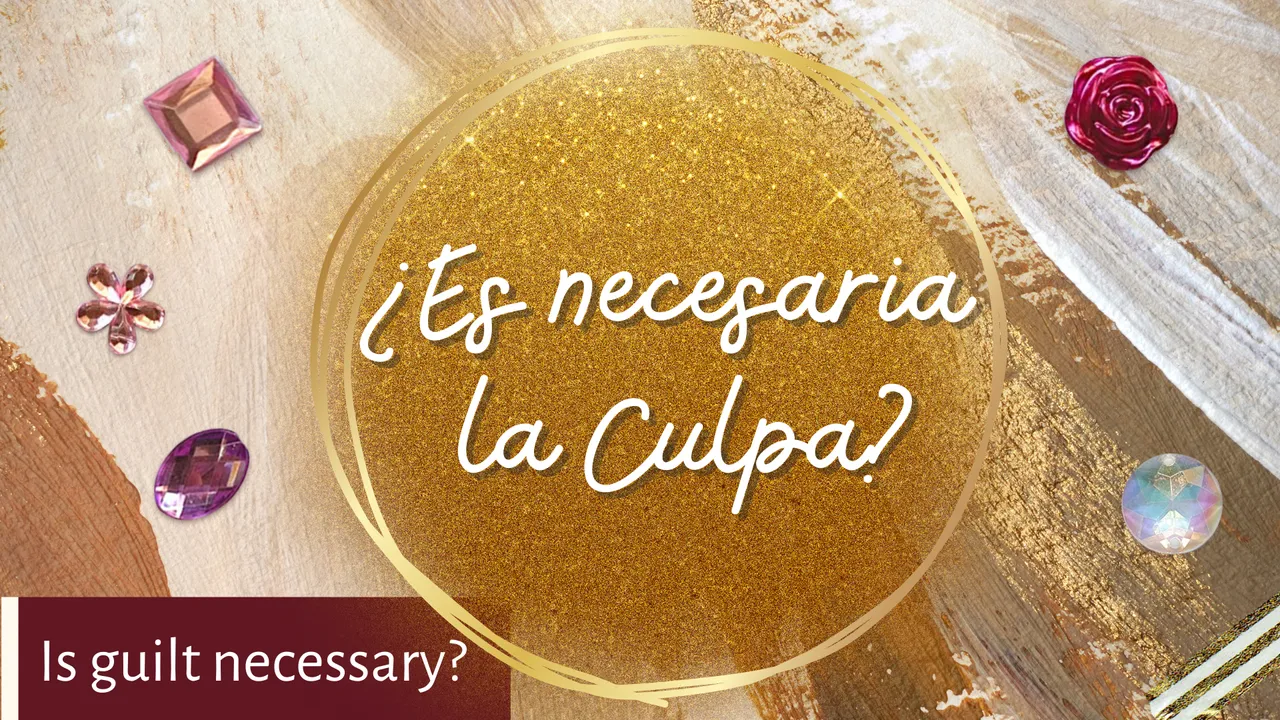

No quiero que me malinterpreten, todos necesitamos el sentir alguna vez culpa, es un sentimiento igual que los demás, el sentir culpa cuando hacemos algo mal, algo que no es social, moral o religiosamente aceptable, o cuando hacemos algo que hiere a los demás es lo adecuado, si no existiera este sentimiento, entonces seríamos como uno de esos individuos completamente enfermos que no sienten remordimiento por nada de lo que hacen y les da igual actuar bien o mal, así que está bien que desde pequeños aprendamos de ella gracias a nuestros padres, pero por supuesto de una forma equilibrada.
Y es que el ser humano necesita sentir culpa, el sentir culpa nos aporta beneficios para nuestro crecimiento personal, nos ayuda a reflexionar sobre lo que hicimos, cambiar nuestras actitudes y volvernos mejores personas para no volver a realizar eso que hace daño a otros, o que nos hace daño a nosotros mismos, por eso ¡el sentir culpa está bien!
Arriba les dije las causas infantiles de desarrollar una culpa que no es normal, pero también existen ocasiones en que la educación infantil estuvo bien de parte de los padres, pero hay personas que cometen actos en su presente o su pasado inmediato, mediato o tardío que los hace desarrollar una culpa patológica porque no supieron manejar lo mal que hicieron o cómo actuaron, entonces se condenaron a una vida llena de dolor por un error que no pudieron cambiar después.
I do not want to be misunderstood, we all need to feel guilt sometime, it is a feeling just like the others, to feel guilt when we do something wrong, something that is not socially, morally or religiously acceptable, or when we do something that hurts others is appropriate, if this feeling did not exist, then we would be like one of those completely sick individuals who do not feel remorse for anything they do and do not care whether they act right or wrong, so it is good that from an early age we learn about it thanks to our parents, but of course in a balanced way.
And the human being needs to feel guilt, feeling guilt brings us benefits for our personal growth, it helps us to reflect on what we did, change our attitudes and become better people to not do again what hurts others, or that hurts us ourselves, so feeling guilt is good!
Above I told you the infantile causes of developing a guilt that is not normal, but there are also occasions in which the infantile education was good on the part of the parents, but there are people who commit acts in their present or their immediate, mediate or late past that make them develop a pathological guilt because they did not know how to handle what they did wrong or how they acted, then they condemned themselves to a life full of pain for a mistake that they could not change later.
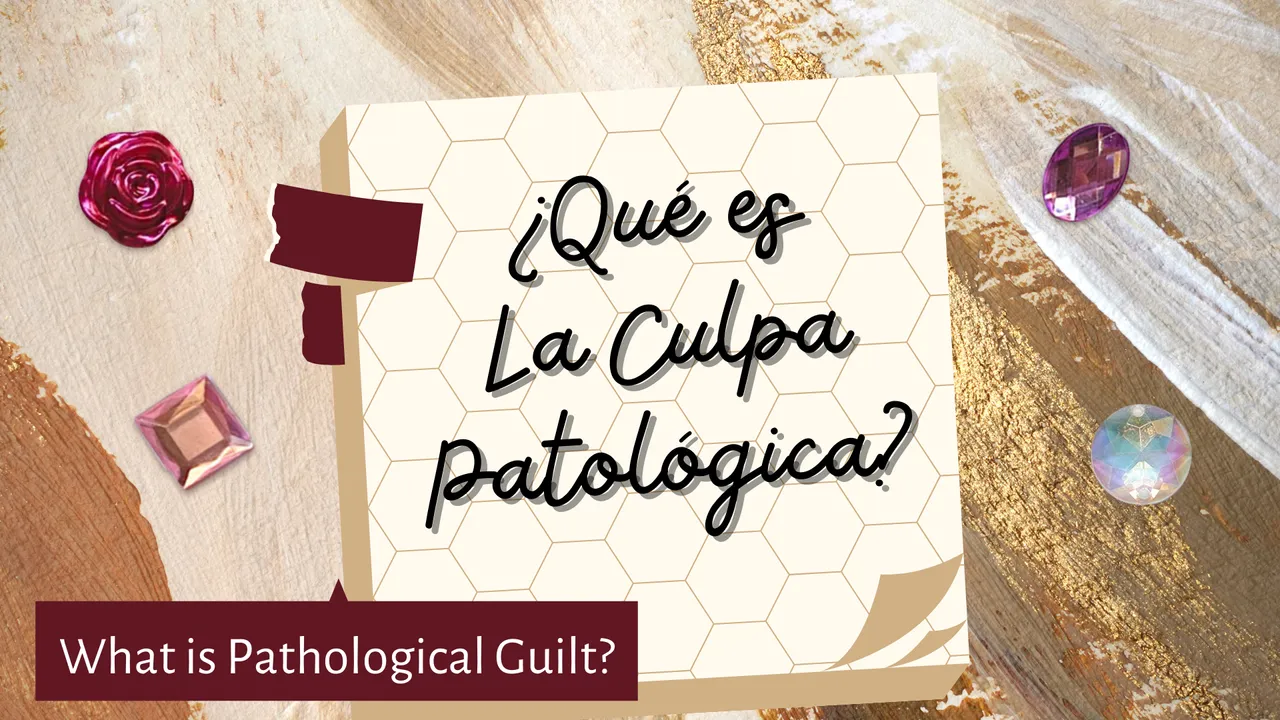

No es lo mismo el sentimiento de culpa, que el sentir culpa patológica, la culpa patológica es esa que te acompaña siempre o intermitentemente, esa que no sabes de donde sale pero te genera un gran sentimiento de malestar, remordimiento y tristeza, que te hace tener pensamientos intrusivos negativos sobre ti mismo, que te hace tener constantemente la necesidad de saldar una deuda que muchas veces ni siquiera sabes cuál es, la culpa patológica es una forma del subconsciente de autolesión a la persona que la siente y que no lo deja vivir en paz.
The feeling of guilt is not the same as feeling pathological guilt, pathological guilt is that which accompanies you always or intermittently, that which you do not know where it comes from but which generates a great feeling of discomfort, remorse and sadness, which makes you have intrusive negative thoughts about yourself, which makes you constantly have the need to pay off a debt that often you do not even know what it is, pathological guilt is a form of subconscious self-harm to the person who feels it and that does not let him live in peace.
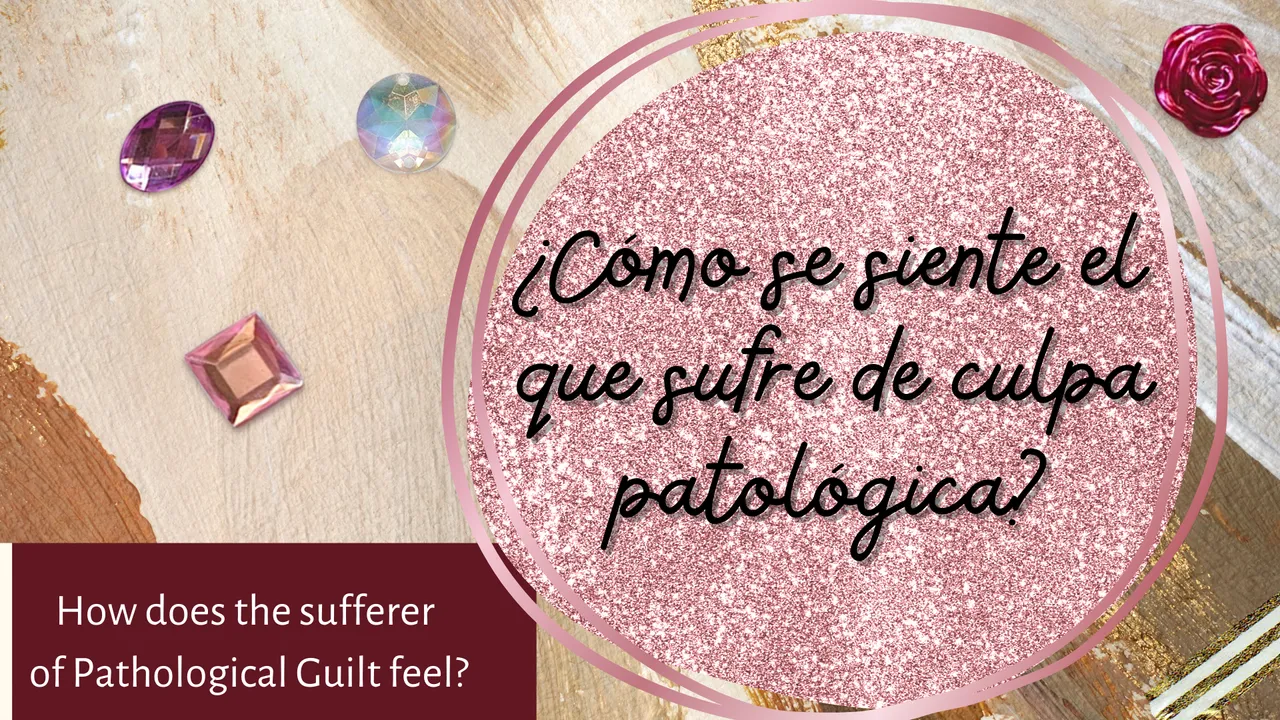

Es difícil distinguir una culpa patológica para la propia persona, tienden a pensar que se sienten así por cualquier error mínimo que han cometido en el momento, pero entonces el sentimiento empieza ahí y sin darse cuenta no solo se sienten mal por eso, sino por otro montón de cosas de las que en realidad no tiene culpa, y es ahí cuando su subconsciente aprovecha de arremeter contra él y utilizar toda esa mala estructura mental aprendida en la infancia y probablemente reforzada en la juventud, cuando aprenden sobre principios morales, sobre religión y sobre principios sociales, que realmente complican todo el asunto.
El que sufre una culpa patológica empieza a pensar que ha actuado mal muchas veces, que no es algo nuevo, que nunca se va a poder perdonar haber actuado así en el pasado porque no actuó entre esos límites estrictos establecidos en la infancia y que luego él mismo reforzó en su juventud o su adultez haciéndose creer que actuó moral, social o religiosamente mal.
La culpa patológica le hace creer que lastimó a alguien o a mucho con tanta maldad que quiere lastimarse por igual y usa mecanismos inconscientes de los cuales ni él se da cuenta, cuyos únicos objetivos son hacerlo sufrir para saldar esa deuda.
La culpa patológica te hace sentir herido tanto por haber cometido un hecho como por no hacerlo cometido, te hace replantearte muchas cosas de las que haces, te hace desvalorizarte y llegar a sentir desprecio por ti mismo, a tal nivel que te hace enfermarte. Es tanto el desorden mental que causa en ti que modifica tu conducta para evitar sentirla nuevamente, pero esa modificación es extrema.
It is difficult to distinguish a pathological guilt for the person himself, they tend to think that they feel that way for any minimal mistake they have made at the moment, but then the feeling starts there and without realizing it they not only feel bad for that, but for a lot of other things that they are not really guilty of, and that is when their subconscious takes the opportunity to lash out and use all that bad mental structure learned in childhood and probably reinforced in youth, when they learn about moral principles, about religion and about social principles, which really complicates the whole thing.
He who suffers from pathological guilt begins to think that he has acted badly many times, that it is not something new, that he will never be able to forgive himself for having acted that way in the past because he did not act within those strict limits established in childhood and which he then reinforced in his youth or adulthood, making himself believe that he acted morally, socially or religiously wrong.
Pathological guilt makes him believe that he hurt someone or a lot of people so badly that he wants to hurt himself equally and uses unconscious mechanisms of which he is not even aware, whose only objectives are to make him suffer in order to pay off that debt.
Pathological guilt makes you feel hurt both for having committed an act and for not having committed it, it makes you rethink many of the things you do, it makes you devalue yourself and even feel contempt for yourself, to such a level that it makes you sick. It is so much the mental disorder that it causes in you that it modifies your behavior to avoid feeling it again, but this modification is extreme.
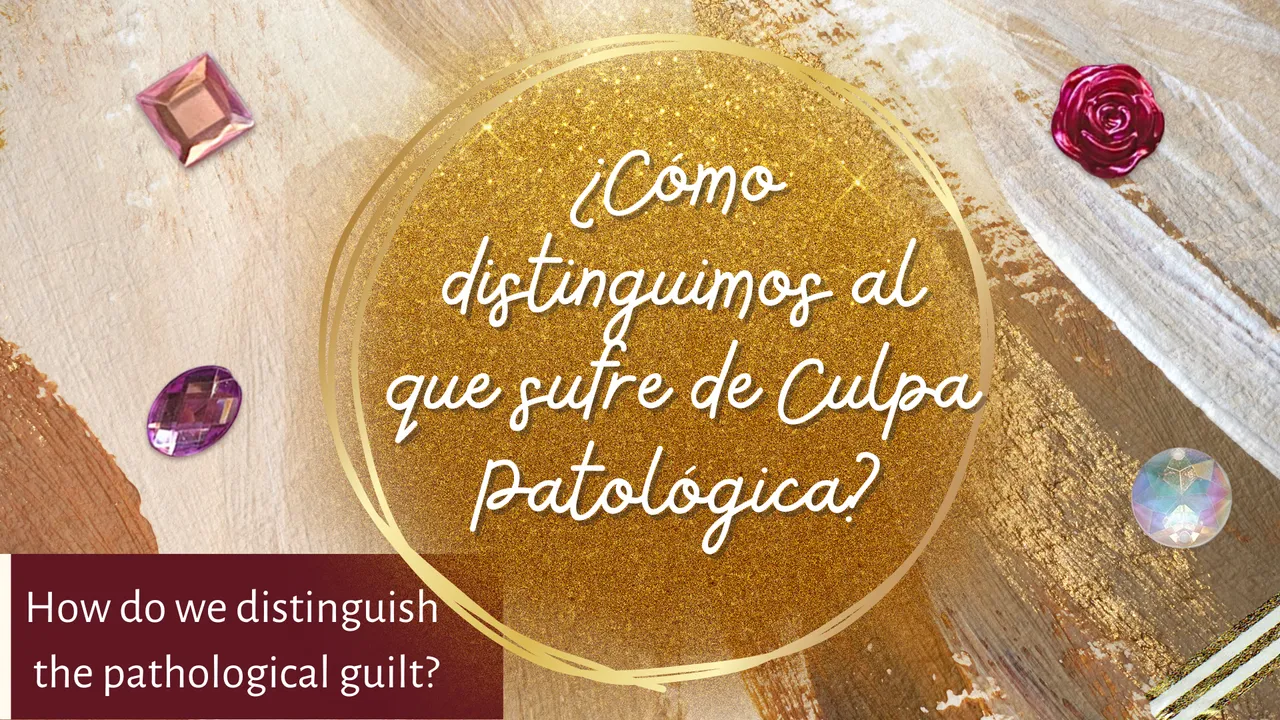

Son personas perfeccionistas, intentan por todos los medios hacer las cosas bien, tanto como quieren hacer las cosas bien para sí mismos, como para los demás, limitan al mínimo la posibilidad de algún error.
Son personas autoexigentes se plantean metas muy difíciles de alcanzar, es como una forma de autocastigo, saben que son metas muy difíciles, pero trabajan incansablemente por ellas porque mientras más difíciles sean alcanzarla será mejor para ellos, probablemente sepan que no las van a poder alcanzar, pero el hecho de presionarse tanto por alcanzarlas hace que se sientan bien en su subconsciente.
Se sienten desvalorizados tienden a ver muchas cosas mal en sí mismos, son más las cosas malas que las buenas las que perciben en ellos, siempre hay mayor cantidad de aspectos negativos que positivos.
Es difícil que se perdonen errores por muy pequeños que sean, tienden a juzgarse muy duramente por cada error que comenten, sienten que lo que hicieron estuvo muy mal, y que no quieren volver a repetirlo nunca más, pero se repiten a sí mismo lo que hicieron como una forma de auto tortura mental.
They are perfectionists, they try by all means to do things well, as much as they want to do things well for themselves as for others, they limit to the minimum the possibility of any error.
They are self-demanding people they set very difficult goals to achieve, it is like a form of self-punishment, they know that they are very difficult goals, but they work tirelessly for them because the more difficult they are to achieve it will be better for them, they probably know that they will not be able to achieve them, but the fact of pushing themselves so hard to achieve them makes them feel good in their subconscious.
They feel devalued they tend to see many things wrong with themselves, there are more bad things than good things they perceive in themselves, there are always more negative aspects than positive ones.
They tend to judge themselves very harshly for every mistake they make, they feel that what they did was very wrong, and that they do not want to repeat it ever again, but they repeat to themselves what they did as a form of mental self torture.
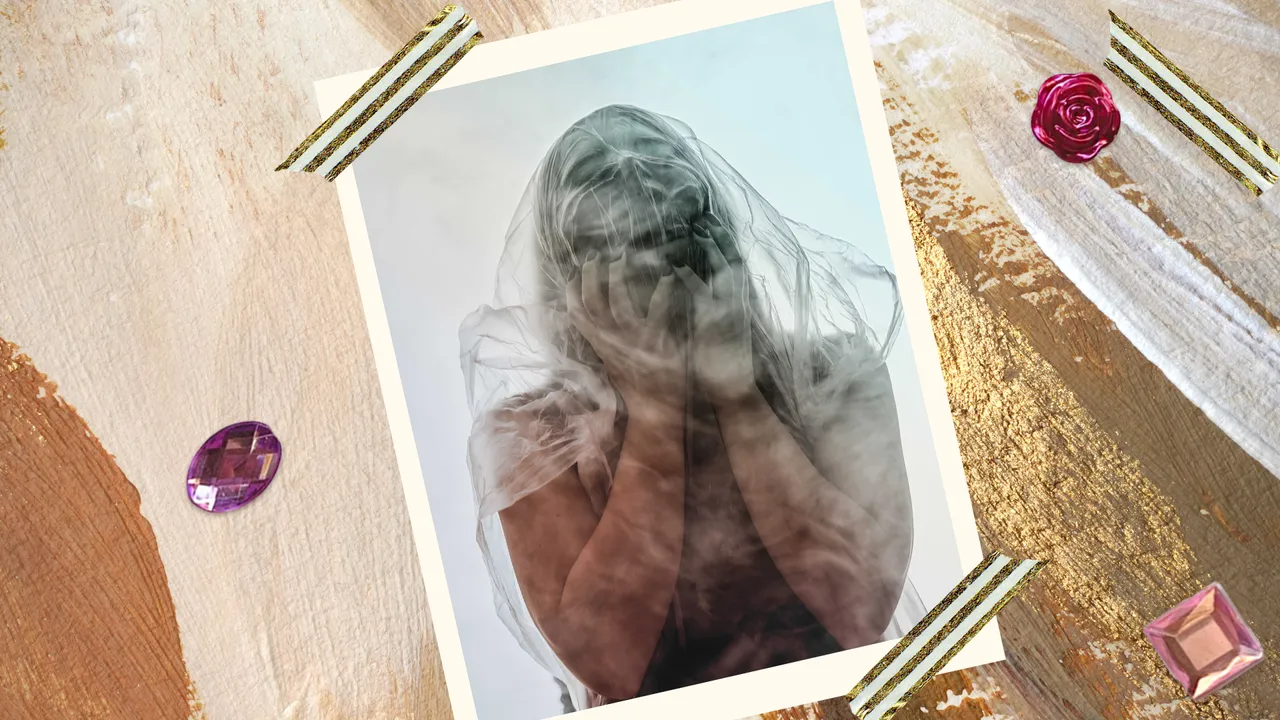

Son personas que sufren de angustia constante o en su defecto de ansiedad y es que el haber cometido esa falla en el pasado hace que les preocupe volver a cometerla después preocupándose constantemente por su futuro, cualquier mínima situación estresante en sus vidas se convierte en un malestar constante de preocupación de que algo pueda salir mal.
Tienen pensamientos negativos constantes, tienden a ser negativos tanto sobre sí mismos como por su futuro o por su alrededor, estos pensamientos son los que principalmente son los causantes de las enfermedades mentales.
Sienten vergüenza, son personas que tienen miedo de cometer errores en público justamente por su nivel de auto exigencia extrema, porque quieren ser perfectos para no volver cometer el hecho que hicieron.
Tienden a sentirse frecuentemente tristes o pueden llegar a presentar verdaderos cuadros depresivos, sienten que nunca van a reivindicarse por el daño que hicieron, llevan tanto tiempo sintiéndose mal que no sienten que pueda haber salida para su problema y terminan cayendo en cuadros de tristeza prolongada que se vuelve patológico.
They are people who suffer from constant anguish or otherwise anxiety and having committed that fault in the past makes them worry about committing it again later constantly worrying about their future, any stressful situation in their lives becomes a constant discomfort of worry that something can go wrong.
They have constant negative thoughts, they tend to be negative about themselves, their future or their surroundings, these thoughts are the main cause of mental illness.
They feel ashamed, they are people who are afraid of making mistakes in public precisely because of their level of extreme self-demanding, because they want to be perfect so as not to make the same mistake again.
They tend to feel frequently sad or they can present real depressive symptoms, they feel that they will never vindicate themselves for the damage they did, they have been feeling bad for so long that they do not feel that there can be a way out of their problem and end up falling into prolonged sadness that becomes pathological.


Boicotean su propia existencia, cuando les va bien en algún tipo de asunto, bien sea personal, familiar, laboral o social, encuentra alguna falla de alguna forma culminando siempre en sentirse nuevamente mal, aun cuando lograron un aspecto positivo en su vida, pero es una forma de masoquismo inconsciente el querer echar a perder sus propias ganancias, porque su forma de sentirse bien inconscientemente es volviendo al sentimiento de culpa permanente.
Pueden llegar a tenerlo todo para ser feliz pero nunca sentirse del todo felices, son personas que pueden tener todo por lo que han soñado y que pensaron que los haría felices en algún punto, pero nunca lo han logrado y es sencillamente por ese vacío existencial por no haber saldado ese error que cometieron.
Algunos prefieren preocuparse por los problemas de los demás que los suyos propios no saben enfrentar sus propios problemas, no saben cómo manejarlos, por lo que empiezan a enfocarse en ver problemas en los demás, problemas que a él no le causan ningún malestar o a lo mejor ni existen en realidad, pero es un mecanismo psicológico para desviar su atención de sí mismos.
Pueden llegar a transferir su culpa a los demás, pueden inconsciente o conscientemente desplazar su culpa hacia otras personas, tienden a pensar que su problema no es su culpa, es culpa de otros que lo hizo actuar así, o son otros los que actúan mal y no él, él cree que siempre hizo las cosas bien.
Son personas que pueden llegar a tener problemas constantes en su trabajo, con su pareja, o en su familia, sencillamente porque buscan proyectar sus propios problemas en los demás y tan mal como se llevan con ellos mismos, se llevan mal con los demás, así que siempre consiguen ambientes hostiles a su alrededor.
They boycott their own existence, When they do well in some kind of matter, whether personal, family, work or social, they find fault in some way, always culminating in feeling bad again, even when they achieved a positive aspect in their life, but it is a form of unconscious masochism to want to spoil their own gains, because their way of feeling good unconsciously is to return to the feeling of permanent guilt.
They can have everything to be happy but never feel completely happy, they are people who can have everything they have dreamed of and thought would make them happy at some point, but they have never achieved it and it is simply because of that existential emptiness for not having paid off that mistake they made.
Some people prefer to worry about other people's problems rather than their own they do not know how to face their own problems, they do not know how to handle them, so they start to focus on seeing problems in others, problems that do not cause them any discomfort or maybe they do not really exist, but it is a psychological mechanism to divert their attention from themselves.
They may transfer their guilt to others, they may unconsciously or consciously shift their blame to other people, they tend to think that their problem is not their fault, it is the fault of others who made them act that way, or it is others who act badly and not them, they believe that they have always done things right.
They are people who may have constant problems at work, with their partner, or in their family, simply because they seek to project their own problems on others and as bad as they get along with themselves, they get along badly with others, so they always get hostile environments around them.
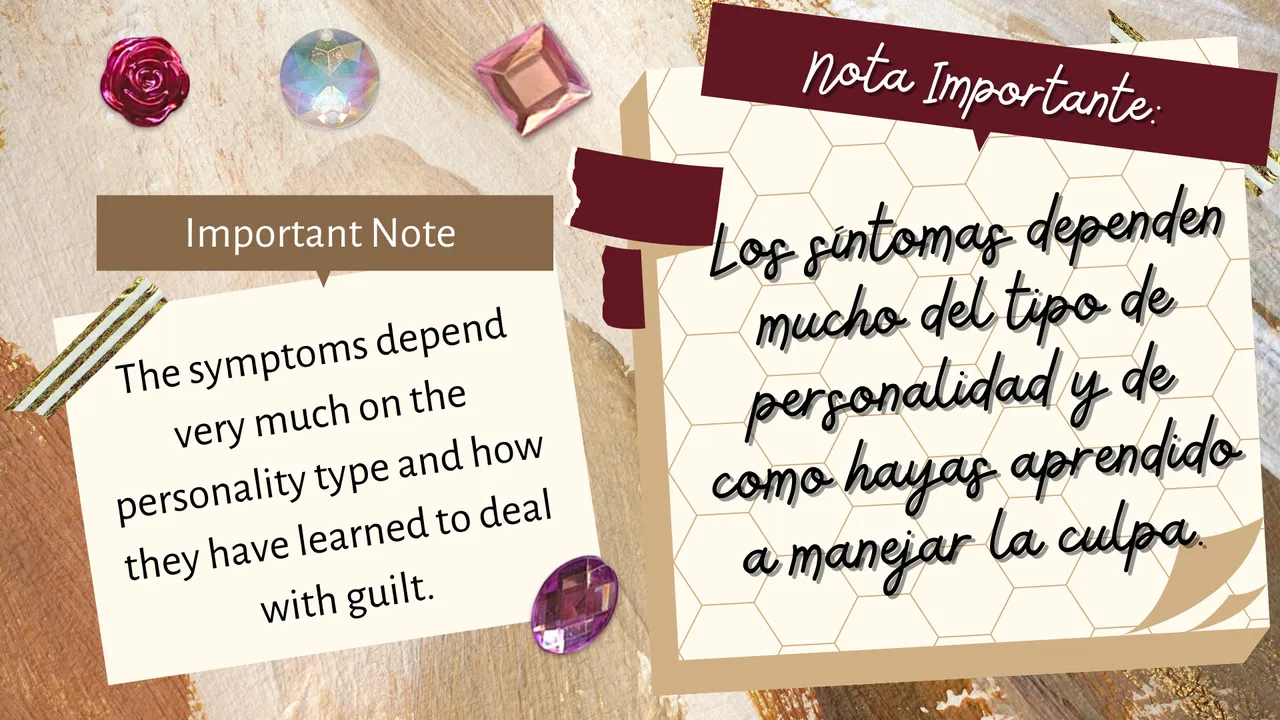

Atención con este factor: en psicología y en medicina nada es blanco o negro, esto que les digo arriba es lo más frecuente que podemos encontrar, pero lo más frecuente no significa que sea lo único, no tienen que ser todos los elementos juntos que tenga la persona, puede que solo tenga algunos, puede que incluso oculte su culpa tan bien que nunca veas nada de esto pero que está en su interior y esa persona ha usado tan buenos mecanismos que nadie los ha podido ver.
Esto es importante porque muchas personas no son capaces nunca de darse cuenta de que tienen una culpa arrastrándola a lo largo de su vida y no quiero que descarten esta posibilidad solo porque no tienen todas las características que les dije arriba o les falta alguna, recuerden que somos seres humanos individuales y la mente humana es distinta una de otra, ningún ser humano es igual a otro mentalmente hablando, ni siquiera los gemelos que son genéticamente iguales.
Los últimos 3 factores dependen mucho de los mecanismos de defensa que haya desarrollado la persona para soportar esa culpa durante mucho tiempo, puede ser que no haya caído en alguna enfermedad mental durante ese tiempo, pero no lo hizo porque usó alguno de esos mecanismos de defensa psicológicos u otros más y desplazó o proyectó su culpa en alguien u otros más, sin embargo, no son factores que son tan frecuentes, dependen mucho de la personalidad.
Atention with this factor: in psychology and in medicine nothing is black and white, what I say above is the most frequent thing we can find, but the most frequent does not mean that it is the only thing, it does not have to be all the elements together that the person has, he may only have some, he may even hide his guilt so well that you never see any of this but it is inside him and that person has used such good mechanisms that no one has been able to see them.
This is important because many people are never able to realize that they have a guilt dragging it throughout their life and I do not want you to dismiss this possibility just because they do not have all the characteristics I told you above or they are missing some, remember that we are individual human beings and the human mind is different one from another, no human being is the same as another mentally speaking, not even twins who are genetically the same.
The last 3 factors depend a lot on the defense mechanisms that the person has developed to support that guilt for a long time, it could be that he/she has not fallen in some mental illness during that time, but he/she did not do it because he/she used some of those psychological defense mechanisms or others and displaced or projected his/her guilt in someone or others, however, they are not factors that are so frequent, they depend a lot on the personality.
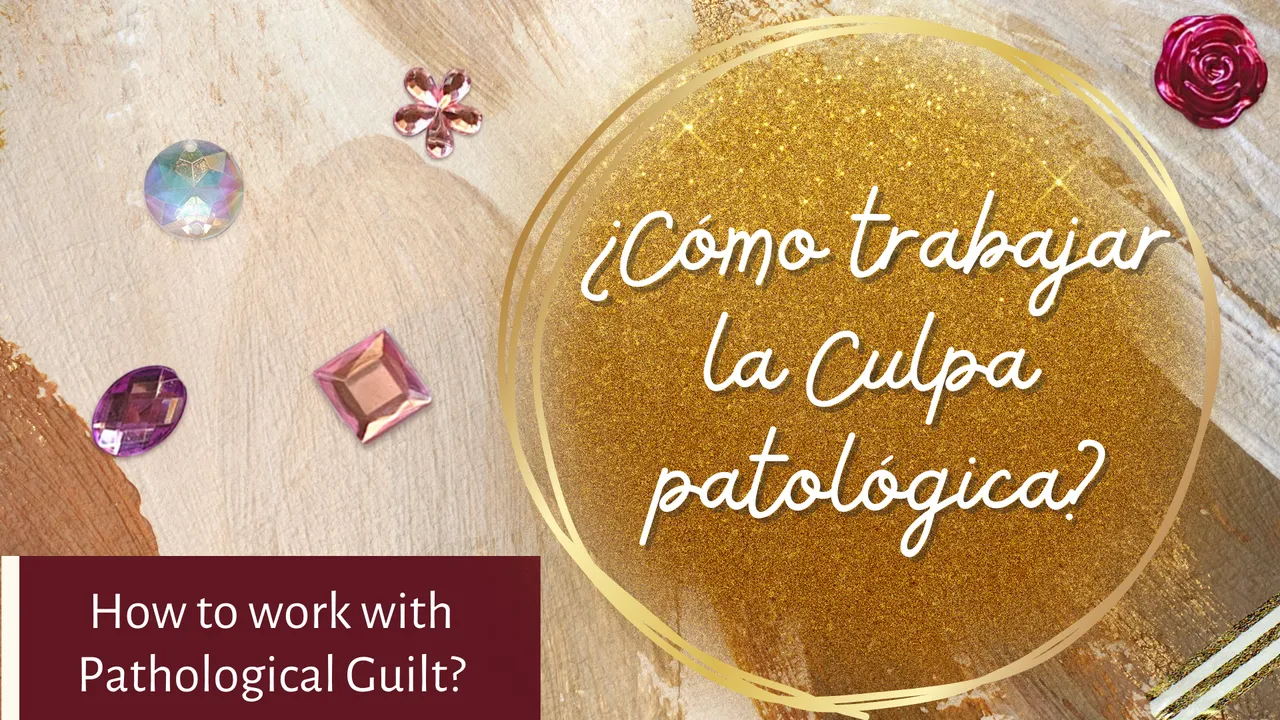

- Lo primero es entender que hay algo mal en nosotros y esto, aunque suene tonto es lo más importante, porque hay personas que pasan la vida pensando que sus formas de actuar están bien y tal vez muchas otras se lo dicen, pero nunca le dieron la importancia debida o tal vez esa persona nunca recibió un consejo de nadie o simplemente no sabía lo que le pasaba, por eso, en algún momento que ocurra el darse cuenta de esto, es el primer paso.
Tratar de descubrir de donde viene su culpa, trata de pensar en retrospectiva desde cuando empezaste a sentirte así ¿Qué fue lo que hiciste?, ¿Realmente es una culpa que tiene sentido de ser?, ¿Vale la pena sentirte tan agobiado por eso que hiciste o fue un error que cualquier podría haber cometido?
Determinar si puedes resarcir el daño hecho si estas a tiempo, porque muchas veces no es así, esa frase que dice que nunca es tarde para arrepentirse está un poco mal, realmente hay ocasiones en que el arrepentimiento llega muy tarde como, por ejemplo ¿Puede ser que la persona a la que le hiciste daño ya no esté? pero si no es tu caso, entonces intenta resarcir el daño hecho.
- Pedir perdón, el disculparnos con la persona a la que creemos que hemos hecho daño puede ser el gran principio del fin de esta culpa que llevas arrastrando por años, así que así no acepte tus disculpas, pídelas, te va hacer sentir mejor y tu subconsciente te lo agradecerá.
- The first thing is to understand that there is something wrong with us and this, although it sounds silly is the most important thing, because there are people who spend their lives thinking that their ways of acting are right and maybe many others tell them so, but they never gave it due importance or maybe that person never received advice from anyone or simply did not know what was wrong with him, so at some point that happens to realize this, is the first step.
- Try to figure out where your guilt comes from, try to think back to when you first started feeling this way, what did you do, is it really a guilt that makes sense to be, is it worth feeling so burdened by what you did or was it a mistake that anyone could have made?
- Determine if you can make amends if you are in time, because many times it is not so, that phrase that says that it is never too late to repent is a little wrong, there are really times when repentance comes too late, for example, can it be that the person you hurt is no longer around, but if it is not your case, then try to make amends.
- Asking for forgiveness, apologizing to the person we believe we have hurt can be the great beginning of the end of this guilt that you have been dragging for years, so even if they do not accept your apology, ask for it, it will make you feel better and your subconscious will thank you for it. **


- Evita proyectar tu culpa en los demás, al aceptar que tienes este sentimiento que está mal en tú debe abrir la ventana de posibilidades a la que entre la posibilidad de que estés echándole tu culpa a otras personas que no hicieron nada malo, o que tal vez no fueron del todo los culpables de tu reacción, por lo que es importante limitar este proceso que llevas a cabo en ti y en los demás, date cuenta que el problema viene de tu interior, no de los demás, es de ti.
- Reconoce el sentimiento cuando aparezca en ti, cuando empiecen los pensamientos negativos, desvalorizantes, hostiles, auto lesivos, y todos los que te dije arriba ¡detente! Y en ese momento cuando empiecen pasa al siguiente punto.
- Usa medidas distractivas, intenta pensar en otra cosa, intenta pensar en las cosas positivas que has hecho, en que el reconocer eso en tu vida te va a permitir nunca más volverlo a hacer, reconoce que es una forma de aprendizaje y que por tal llegó a tu vida y que estás dispuesta a aceptarla y cambiar tu vida a partir de este momento.
- No seas tan exigente contigo mismo, sé compasivo contigo, es un error que cometiste y como todo ser humano somos capaces de cometer errores y una vez que los cometemos solo los queda pedir disculpas, aprender de ellos y crecer, de nada nos sirve torturarnos toda la vida por algo que nunca quisiste hacer y que ya no puedes borrar de tu pasado.
- Avoid projecting your guilt on others, by accepting that you have this feeling that is wrong in you should open the window of possibilities to the possibility that you are blaming other people who did nothing wrong, or maybe they were not entirely to blame for your reaction, so it is important to limit this process that you carry out in you and in others, realize that the problem comes from within you, not from others, it is from you.
- Recognize the feeling when it appears in you, when the negative, devaluing, hostile, self-injurious thoughts start, and all those I told you above, stop! And then when they start, go to the next point.
- Try to think about something else, try to think about the positive things you have done, that recognizing this in your life will allow you to never do it again, recognize that it is a way of learning and that this is why it came into your life and that you are willing to accept it and change your life from this moment on.
- Don't be so demanding with yourself, be compassionate with yourself, it is a mistake you made and like all human beings we are capable of making mistakes and once we make them we can only apologize, learn from them and grow, it is useless to torture ourselves all our lives for something you never wanted to do and that you can no longer erase from your past.


- En el caso de las personas que creen que cometieron un acto que no es socialmente aceptable, recuerda que tú no eres un juez, no tienes por qué juzgarte tan fuertemente a ti mismo, para poder juzgar debemos tener conocimientos que no todos tienen, ese trabajo no es tuyo para eso se estudia y se dedica a las leyes. Si no eres una persona dedicada a las leyes no estad en capacidad de determinar el grado de culpabilidad que tienes por algún hecho, ese trabajo no te pertenece amigo.
- En el caso que creen que cometieron un acto que la religión no les va a perdonar, no sé qué tipo de religión prácticas o si prácticas algunas o crees en energías o cualquier tipo de ser o cosa superior que comanda todo, pero estoy segura de que ese ser superior no es vengativo ni es castigador, por lo general los Dioses fueron creados con la finalidad de tener esperanzas en ellos, en que te ayuden en momento difíciles y que te cuiden.
- De nada te sirve vivir una vida regida por una religión si por dentro te vas a sentir condenado de por vida por haber cometido un error que ella misma te hace sentir. Y ¡ojo! traigo a colación este punto aquí porque realmente en la sociedad es algo preestablecido el seguir una religión o no, y muchísimas veces las religiones establecen límites muy estrictos que son culpables de una gran porción de personas que sufren de culpas patológicas, lo veo constantemente en las consultas y solo por eso considero importante colocarlo aquí.
- Felicítate por todo lo bueno que has logrado a partir de ese error, piensa en las cosas positivas en ti, no solo en las malas, repito nuevamente: ten compasión por ti, así como probablemente las tengas por los demás.
- In the case of people who believe that they committed an act that is not socially acceptable, remember that you are not a judge, you do not have to judge yourself so strongly, to be able to judge we must have knowledge that not everyone has, that job is not yours for that is studied and dedicated to the laws. If you are not a person dedicated to the laws you are not able to determine the degree of guilt that you have for some fact, that work does not belong to you friend.
- In the case that you believe that you committed an act that religion will not forgive you, I don't know what kind of religion you practice or if you practice some or believe in energies or any kind of superior being or thing that commands everything, but I am sure that this superior being is not vengeful or punishing, in general the Gods were created with the purpose of having hope in them, that they help you in difficult moments and that they take care of you.
- It is useless to live a life governed by a religion if inside you are going to feel condemned for life for having made a mistake that it makes you feel. I bring up this point here because really in society it is something pre-established to follow a religion or not, and many times religions set very strict limits that are guilty of a large portion of people who suffer from pathological guilt, I see it constantly in consultations and only for that reason I consider it important to place it here.
- Congratulate yourself for all the good things you have achieved from that mistake, think of the positive things in you, not only in the bad ones, I repeat again: have compassion for yourself, as you probably have for others.
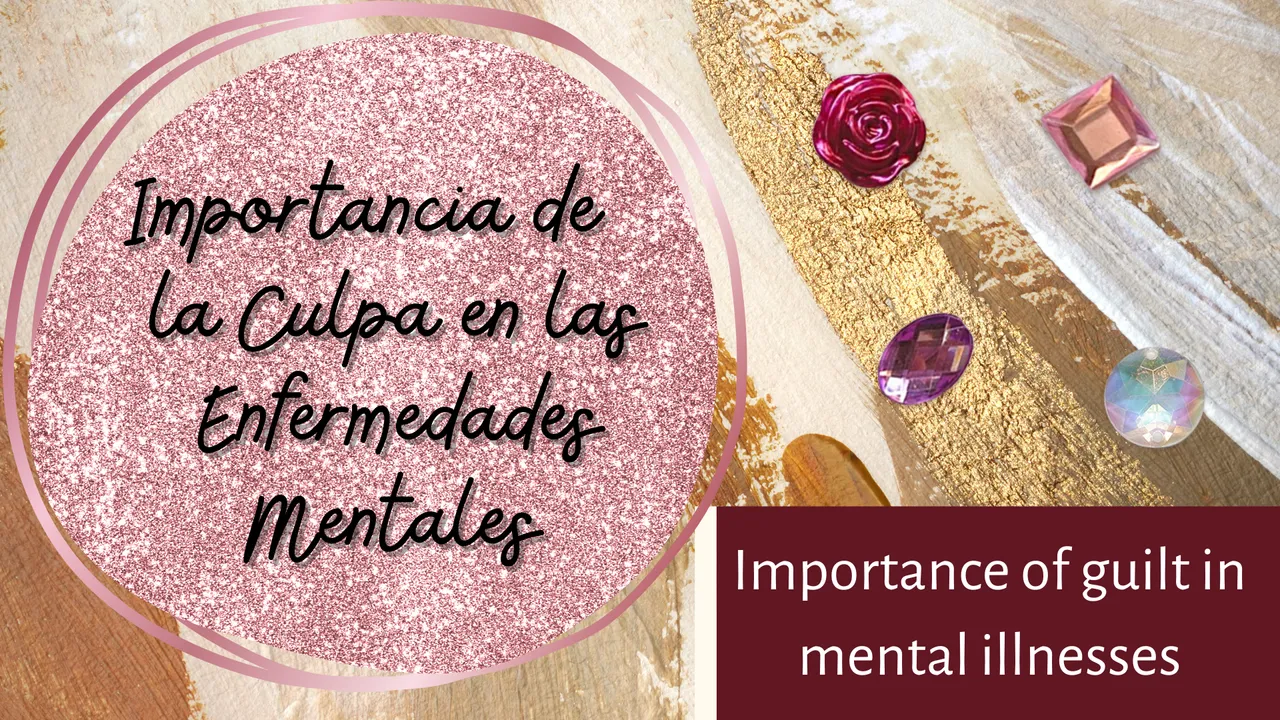

La culpa amigos míos hay que saber manejarla, es importante que la persona se dé cuenta cuando su sentimiento de culpa no es acorde, cuando es exagerado, cuando se repite una y otra vez o cuando se prolonga en el tiempo y va acompañado de otros síntomas como los que les dije arriba, porque la culpa es una de las principales causas de enfermedades mentales como La Depresión.
Manejar una culpa patológica es bastante complicado y difícil por eso es importante reconocerla a tiempo y utilizar mecanismos para tratar de eliminarla, pero si no hay mejoría aun intentándolo por tu cuenta, como siempre digo en mis post, es importante buscar ayuda profesional psicológica y dependiendo de cómo progreses en la terapia el mismo psicólogo se encargará de decirte si es necesario referirte a un médico de alguna especialidad.
Porque lo más importante en las enfermedades mentales es la prevención, cuando una persona ya entran en una enfermedad mental es un proceso sumamente complicado de manejar, por ello esta es mi idea con mis post, que estén informados y puedan reconocer factores en ustedes o en los demás que no sean del todo normal para manejarlos a tiempo y evitar caer en enfermedades como la Depresión.
It is important that the person realizes when his feeling of guilt is not in accordance, when it is exaggerated, when it is repeated over and over again or when it is prolonged in time and is accompanied by other symptoms such as those I told you above, because guilt is one of the main causes of mental illnesses such as depression.
Handling a pathological guilt is quite complicated and difficult that is why it is important to recognize it in time and use mechanisms to try to eliminate it, but if there is no improvement even trying on your own, as I always say in my posts, it is important to seek professional psychological help and depending on how you progress in therapy the same psychologist will tell you if it is necessary to refer you to a doctor of any specialty.
Because the most important thing in mental illness is prevention, when a person is already in a mental illness is an extremely complicated process to manage, so this is my idea with my posts, to be informed and can recognize factors in you or others that are not quite normal to handle them in time and avoid falling into diseases such as depression.

I hope as always that my post is helpful and thank you very much for stopping by and reading it.

Edición de banner imagenes y separadores / Image and editing, banner and separators:
Todas las imagenes fueron editadas por @liveofdallla, con Canvas usando fotos de Pixabay y Pexels.
All images were edited by @liveofdallla, with Canvas using photos from Pixabay and Pexels.
Tradución / translation:
DeepL
Mis redes sociales / My social Networks
| Twitter | Facebookr| Instagram|
